Suspected Israeli Strike Hits Syria, Causes Material Damage
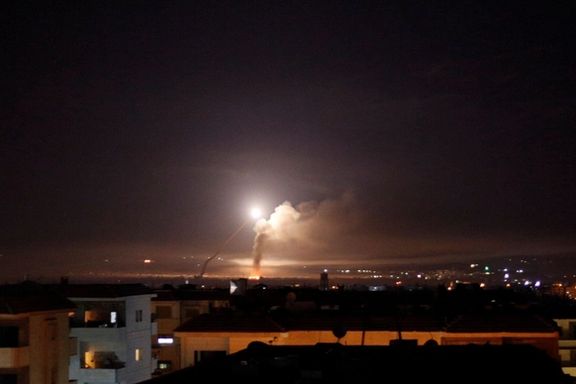
An air defense facility in southern Syria was targeted early Friday with a missile purportedly fired from Israel, causing material damage.

An air defense facility in southern Syria was targeted early Friday with a missile purportedly fired from Israel, causing material damage.
Syrian state media reported that the airstrike hit the air defense installation in the southern province of Daraa early Friday.
“At around 2:55 am this morning, the Israeli enemy launched a missile attack from the north of occupied Palestine, targeting our air defense sites in the southern region [of the country]. The aggression resulted in material damage,” SANA quoted a military source as saying.
The UK-based Syrian Observatory for Human Rights (SOHR) said some loud blasts were heard in the countryside of Daraa during the early hours of Friday, linking them to a possible Israeli airstrike that targeted an air defense radar between the city of Izraa and Qarfa town.
Observatory head Rami Abdel Rahman said six Israeli fighter jets were seen entering Syrian airspace and heading east. Rahman also said the jets were flying eastward when they were picked up by the radar.
This strike came as news of an airstrike on the Iranian city of Isfahan was carried out by Israel —a major city in which several sensitive nuclear facilities are based.
While Iran-backed groups operate out of Syria, It is unclear whether the strikes are directly linked to the Isfahan explosions.
The state news agency IRNA reported early Friday that "Iran's air defense systems were activated in the skies over multiple provinces". This came after the state broadcaster IRIB reported hearing "large explosions" near Esfahan.
US officials have since confirmed in multiple reports that Israel carried out the strike, though the scope of damage has yet to be confirmed.
This latest news followed Iran’s drone and missile attack on Israel last weekend – the first-ever direct assault on the country. Iran says that strike was in response to a widely-believed Israeli attack on an alleged Iranian consulate in Damascus earlier this month.
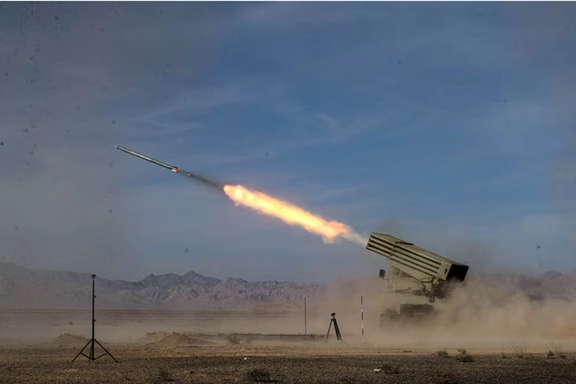
Explosions were heard near the central-western city of Isfahan early Friday as Israel reportedly launched a widely anticipated strike in retaliation to an Iranian attack over the weekend.
State-run IRNA news reported the "activation of anti-aircrafts'' in Esfahan's 8th Shekhari Air Base Base while downplaying the situation as "normal." Meanwhile, flightradar24.com showed that for hours after the incident, Iranian air traffic was lower than usual.
Iranian officials have not officially confirmed the attack was carried out by the Israelis and merely said Esfahan's air defenses have targeted several “micro-birds and suspicious objects”.
US officials confirmed to ABC News that three missiles were fired from Israeli fighter aircraft outside of Iran. "The Israelis were targeting an air defense radar site near Esfahan that’s part of the protection of the Natanz nuclear facility," an official said. "The first assessment is that the strike took out the site, but assessment hasn’t been completed," the official said.
A report in the New York Times quoted two Israeli and three Iranian officials who said the Israeli army had launched an attack on Iranian targets. The NYT further reported that Iranian officials confirmed to them that a strike had hit a military air base near Esfahan.
Bloomberg wrote that Israelis had notified US officials before the attack.
The Italian foreign minister stated that the US informed the G7 foreign ministers that it had received "last-minute" information from Israel about an upcoming operation in Iran.
US Secretary of State Antony Blinken declined to comment on the overnight attack in Iran, stating that Washington does not participate in any offensive operations.
Around the same time as the incident in Iran, Syria's SANA news agency reported Israel had fired missiles at an air defense unit in the country’s south, which is directly west of Esfahan, some 1,500 kilometers away. Syria's Observatory for Human Rights reports that the strike targeted a military radar used by the government.
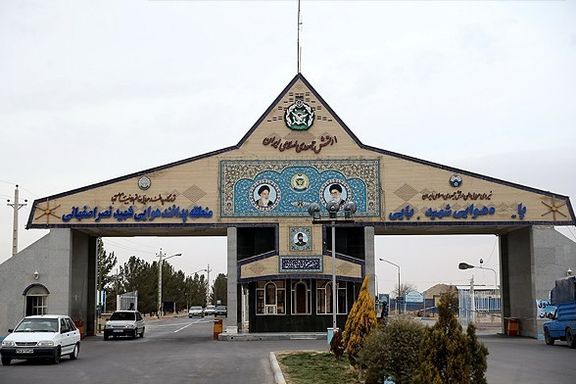
With Iranian state media confirming that the antimissile system was activated at Esfahan's 8th Shekari Air Base, and US media confirming its significance as a major air base, attention is inevitably focused on that specific location.
It is one of the 17 active air bases of the Islamic Republic Army, known as the "heart of the country's air defense" due to its location in one of its most central parts. Iran's fleet of F-14 Tomcat aircraft—purchased before the 1979 Islamic Revolution—is headquartered at this base.
Farzin Nadimi, a Senior Fellow with The Washington Institute, told Iran International besides two military bases, Esfahan is home to the Shahed Aviation Industries Research Center, which manufactures the Shahed-136 drones.
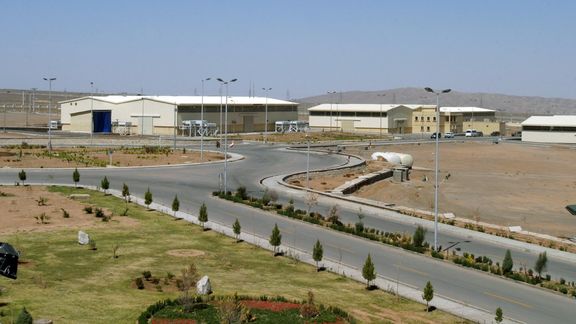
Esfahan is also home to sites associated with Iran's nuclear program, such as its underground Natanz enrichment site, which Israeli sabotage activities have purportedly repeatedly targeted.
After the incident, state television described all the area's nuclear sites as "fully safe."
The United Nations' nuclear watchdog, the International Atomic Energy Agency, also stated there had been no damage to Iran's nuclear facilities.
Although there are no official reports of what type of weapons were used during the attack, experts have speculated what might have occurred.
Nadimi, who specializes in security and defense affairs, told Iran International that Israel would not use regular or laser bombs to carry out the attacks as they have done in the past. Since 2015, the Israeli military has possessed missiles with a range of 1,500 kilometers that can be launched from aircraft, which means they can be fired without entering the Esfahan anti-aircraft airspace.
According to the Jerusalem Post, long-range missiles were used in the attack to avoid Tehran's radar detection capabilities, debunking Iran's claims that "micro drones" were used.
It’s worth mentioning that Reuters quoted a senior Iranian official who said the attack might be by "infiltrators" rather than by Israel.
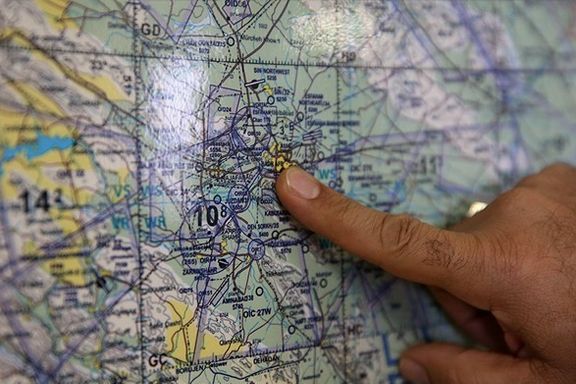
Iran launched over 350 projectiles on Saturday night following the alleged April 1 Israeli air strike on the Iranian consulate in Damascus in which two senior IRGC commanders were killed along with several others.
Some experts believe the relatively small scale of Friday's attack may be attributed to pressure exerted by the US and its allies, as well as the fact that Israel is engaged on other fronts with Hamas and Hezbollah.
An unnamed Israeli official told the Washington Post that the attack "was intended to signal to Iran that Israel had the ability to strike inside the country".
Some analysts have taken a different stance, comparing the aftermath of the attacks rather than how they were carried out.
Menashe Amir, a Middle East affairs analyst, told Iran International that the attacks are comparable: Iran intended to target the Nevatim Airbase, and Israel also attacked a military base in return. The difference is that Iran had to make extensive use of artillery while Israel did not have to, which shows the superiority of Israel's military power.
According to Amir, the attack fits the doctrine the Israeli military has always pursued: not to engage in war on several fronts.
Political analyst Hessam Dastpish told Iran International that both Iran and Israel achieved their respective objectives through the use of their respective methods of conflict. Iran created a massive scene to satisfy proxy groups, while Israel wanted the support of the US and allies, so under their pressure, it pursued a different strategy.
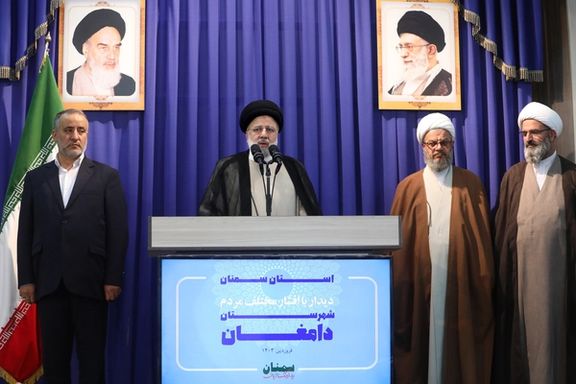
Iranian President Ebrahim Raisi avoided addressing Israel’s attack on the country on Friday, opting instead to praise Tehran’s own attack on Israel last week.
Raisi described the recent attack on Israel as a “unifying” event that was supported across all Iranian political factions.
"All groups and political streams believe that the attack on Israel was a necessary action, unifying and a great honor for the country," Raisi stated during a visit to Damghan in central Iran.
His comments come as the Islamic Revolutionary Guards has put pressure on media and journalists not to write or publish anything critical of Tehran’s attack on Israel last weekend.
The IRGC-linked Tasnim News Agency published a statement on X earlier this week that said the Guards were about to start "to deal with Israel's supporters on social media."
The statement called on citizens to turn in those who support Israel on social media.
While multiple reports confirmed that Israel had carried out an airstrike – the Iranian government quickly downplayed the claims, suggesting instead that the explosions were caused by the interception of microdrones by Iran's air defenses, attributing the incident to "infiltrators".
Tehran appeared to indicate that it has no plans for retaliation, in a likely bid to avoid a full-scale war with Israel.
That stance was echoed by a senior Iranian official who spoke to Reuters, who said "the foreign source of the incident has not been confirmed. We have not received any external attack, and the discussion leans more towards infiltration than attack".
Israel has not yet confirmed its role in the attack on Iran, although it had previously announced intentions to retaliate.
Iran’s attack on Israel last weekend saw over 300 drones and missiles launched, with 99% of them intercepted by Tel Aviv and its allies.
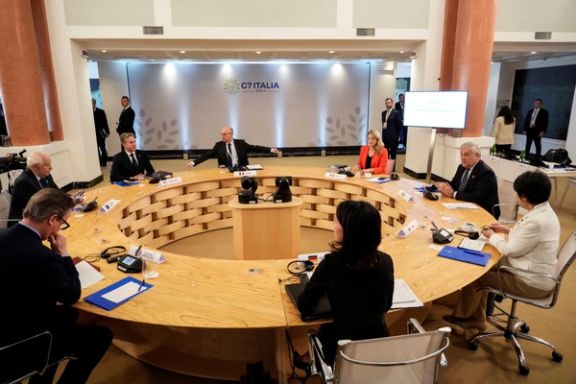
Group of Seven (G7) major powers warned China on Friday to stop Russia’s war on Ukraine, while urging de-escalation in the Middle East after a suspected Israeli attack on an Iranian military base.
The G7 pledged to bolster Ukraine's air defenses to counter increasingly deadly Russian attacks, partly supported by thousands of kamikaze drones supplied by Iran. The United States and the European Union major powers this week pledged to impose more sanctions on entities involved in Iranian weapons proliferation.
Foreign ministers from the G7, comprising the United States, Italy, Canada, France, Germany, Japan and Britain, wrapped up three days of talks on the island of Capri that were dominated by wars in Ukraine and the Middle East.
They acknowledged they had to do more to help Ukraine, which is struggling to hold off stronger Russian forces, and urged de-escalation in the Middle East, where the deep enmity between Israel and Iran risks triggering a wider regional conflict.
DE-ESCALATION
The foreign ministers' summit ended shortly after what sources described as an Israeli attack on Iran in retaliation for a recent Iranian drone and missile assault on Israel.
The G7 ministers said they would work to prevent conflict between Israel and Iran spiralling out of control, while simultaneously seeking to end the war in Gaza.
"The political objective of the G7 is de-escalation. We have worked and continue to work to be active players in securing de-escalation throughout the Middle East," Tajani said.
But the ministers also said the multitude of global crises was pulling leading democracies closer together.
"We emerge from this meeting of the foreign ministers more united than ever," said US Secretary of State Antony Blinken.
An informal alliance has emerged between Iran, Russia, China and North Korea since 2022 when the Russian invasion of Ukraine hit a snag, with Kyiv’s forces pushing back the initial Russian advance. However, a delay in US aid, triggered by some Republicans in the US Congress, and Europe running low on military hardware, has starved Ukraine of critical weapons systems.
The US House of Representatives might, however, finally get to vote on a $61 billion package for Kyiv this weekend.
Alarmed by growing Russian momentum on the battlefield, Ukrainian Foreign Minister Dmytro Kuleba came to Capri in person to tell G7 allies that they needed to send more aid, saying wars in his home country and the Middle East were linked.
Iran supplies Russia with the same type of armed drones that were used last week as part of its large-scale attack on Israel.
"The narrative that the West has to choose between supporting Israel or Ukraine is wrong because these are two theatres of the same war," Kuleba told reporters.
The G7 said in a statement it would increase security assistance for Kyiv, specifically bolstering "Ukraine's air defence capabilities to save lives and protect critical infrastructure".
Two years after launching its invasion, Russia has been targeting key Ukrainian energy infrastructure, killing hundreds of civilians in its strikes. Russia says the energy system is a legitimate target and denies targeting civilians.
CHINA
Blinken said that, while North Korea and Iran were the main suppliers of weapons to Russia, China was the "primary contributor" to Moscow's defence industry.
"If China purports on the one hand to want good relations with Europe and other countries, it can't, on the other hand, be fuelling what is the biggest threat to European security since the end of the Cold War," he said.
Echoing that sentiment, German Foreign Minister Annalena Baerbock told reporters that Berlin could not tolerate seeing China forging closer ties with Russia.
"If China openly pursues an ever-closer partnership with Russia, which is waging an illegal war against Ukraine, ... we cannot accept this," she said at the end of the Capri meeting.
With reporting by Reuters
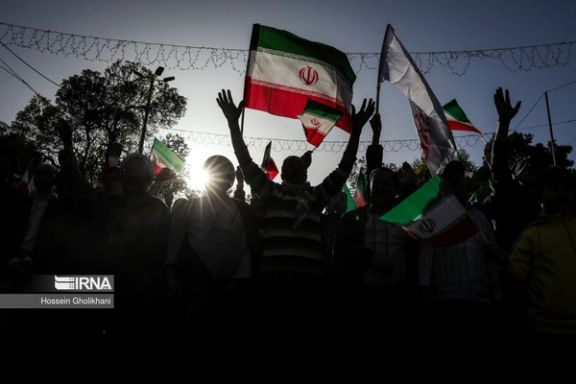
The head of Revayat-e Fath Foundation, an IRGC-affiliated cultural center, said the foundation is going to produce cinematic works on Iran’s offensive against Israel.
Hailing Iran’s missile and drone attacks, Ali Moqavasaz stressed that Revayat-e Fath Foundation intends to memorialize the “historic day” through backing artworks glorifying the event and also organizing a festival.
So far, no filmmakers have announced their readiness to produce works in this regard but we aim to take a serious action and make films about Israel, Palestine and the Islamic Republic’s missile and drone attacks against Israel, he went on to say.
Iran launched a barrage towards Israel on Saturday night of over 350 drones and missiles, most of which were intercepted by Israel and its allies before reaching Israeli territory.
The attack, Iran claims, was retaliation for the alleged Israeli airstrike on the Iranian consulate in Damascus this month, in which a senior Quds Force commander was killed along with other IRGC personnel.
Moqavasaz also pledged that Revayat-e Fath is going to produce cinematic productions about IRGC commanders. However, he did not elaborate on the identities of the financiers of these projects.
The Iranian government does not clearly announce the amount of funds allocated to many state-sponsored organizations and institutions, and the details of their expenditures are not reported at the end of the year.
Four years ago, Revayat-e Fath made a feature film named “Sniper” with a budget of at least 100 billion rials (around $400,000 at that time). The film, which narrated the adventures of a sniper during the Iran-Iraq war, was evaluated by critics as “low quality.”
The foundation also produced in 2011 the notorious movie “Golden Collars” directed by former intelligence officer Abolqassem Talebi. The movie garnered harsh criticisms from the public for its reproduction of the regime’s account of the Green Movement, the unprecedented protests following Iran’s controversial presidential elections in 2009.
Revayat-e Fath Foundation is named after a series of documentaries produced by renowned pro-government filmmaker and author Morteza Avini about Iran-Iraq eight-year military conflict. Iranian officials and state media frequently credit Avini for his ideas of “Islamic and revolutionary art and cinema.” Revayat-e Fath literally means “the narrative of conquest.”
Following the 2022 uprising triggered by the death in morality-police custody of Mahsa Amini, former head of Revayat-e Fath Foundation Mohammad Naderi lambasted artists who supported the nationwide protests, many of whom were threatened with travel bans, work bans and even prison.
“A number of famous figures have been openly and publicly kicking [the government] over the past months. This is our fault because some institutions and organizations were busy making celebrities and ignored the real artists”, Naderi said, further adding that the protesting artists were “useless figures and celebrities” who “betrayed the government, people and country.”
In October, the Iranian government officially released a list of actresses who are prohibited from working in the film industry due to refusal to wear the mandatory hijab. The list includes several well-known figures in the Iranian film industry, such as Baran Kosari, Vishka Asayesh, Taraneh Alidousti, Katayoun Riahi, Panteha Bahram, Hengameh Ghaziani, Pegah Ahangarani, and more.
"Due to the constraints they confront, these actresses will no longer be able to pursue their careers in cinema. Nevertheless, their previous works will be gradually released to safeguard the interests of film producers, given the substantial investments made in these projects. However, they will be barred from participating in any forthcoming film productions," said Habib Ilbeigi, the director of the Supervision Department in the state-affiliated Film Organization.
Despite spending a lot of money, the films and series produced by the Iranian government, tasked with promoting the ideological worldview of the Islamic Republic, have not been able to win the public’s approval in Iran, with some even becoming the butts of ridicule and mockery.
In January, a scene from a TV series was shared extensively by social media users in Iran as it depicted clerics being attacked by security forces several decades ago. Broadcast on Iran’s state TV, “Motherland” (“Sarzamin-e Madari” in Persian) covers the sociopolitical history of the country over a time span of 37 years, from 1942 to the birth of the Islamic Republic in 1979, according to the ruling regime's ideological prism. IRGC-affiliated Fars news agency has hailed the series as “the narrator of the ups and downs of the history of Iran in the contemporary era.”
In one scene, which is apparently aimed at promoting an oppressed picture of clerics during the reign of Pahlavi monarchs in the 20th century, security forces are shown to be shooting and killing clergymen. The scene went viral on X and Instagram as Iranian users remixed it with happy, celebratory and heroic songs in what can be interpreted as an explicit gesture of opposition to the theocratic government in the country.
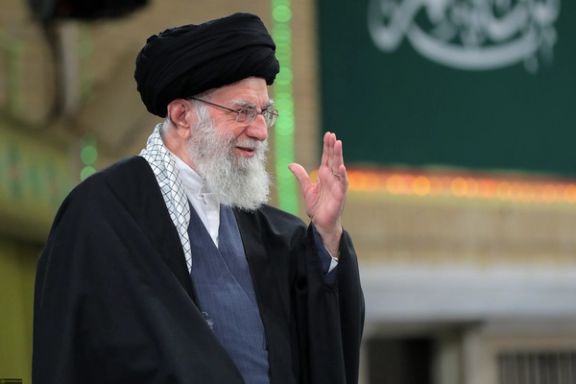
The fundamental policy of the Islamic Republic has traditionally been to avoid direct confrontation with Israel, instead strategically maneuvering its proxy groups across the Middle East like pieces on a chessboard.
This time, spurred by revolutionary slogans and the demands of his supporters, Supreme Leader Ali Khamenei shifted his strategy and accepted the risk of direct confrontation, launching missile attacks on Israeli territory.
A week ago, during Eid al-Fitr prayers, Khamenei declared that "Israel must be punished and will be punished". Similarly, commanders of the infamous Islamic Revolutionary Guards had vowed a "decisive and regrettable response" to Israel’s attacks on Iran’s purported consulate in Syria.
While on the surface the promise of revenge appears to be a strategic mistake, it raises the question as to why the state would pursue such a course of action – despite the international, political, and economic consequences.
The religious approach appears rigid and uncompromising, not open to diverse methods or interpretations. It emphasizes demonstrating resilience, with resistance seen as crucial to victory. In this view, persisting with a "fighting" strategy, even if mistaken, signifies a steadfastness in belief and faith.
The policymaking process in the Islamic Republic, however, does not follow the pattern of rational choice or the model of a prudent actor.
Rationality in foreign policy is a model in which the government acts coherently, and policymaking and decisions are based on clear goals and national interests, defined priorities, sufficient information, and understanding of options to achieve those goals, provided that the likelihood of success and the benefits and costs of each chosen policy are examined and evaluated in advance.
Role of Cognitive Maps in the Decision-Making of the Supreme Leader of the Islamic Republic of Iran
One characteristic of policymaking in the Islamic Republic is the existence of hierarchical and non-systematic decision-making procedures.
The hierarchical decision-making pattern in the Islamic Republic indicates that the Ministry of Foreign Affairs or governments do not have a decisive role in foreign policy policymaking.
Former President Hassan Rouhani and former Foreign Minister Mohammad Javad Zarif frequently criticized the marginalization of the Ministry of Foreign Affairs from foreign policy decision-making and expressed concerns about the military's dominance over diplomacy.
In response to these criticisms, Khamenei asserted in a speech on April 30, 2021, that "foreign policy is determined in high-level forums around the world, not in the Ministry of Foreign Affairs. The Ministry of Foreign Affairs participates in setting policies but is not the decision-maker; it is the executor."
Khamenei even considers the Supreme National Security Council – a key body responsible for overseeing national security affairs – to have a consultative role rather than a policymaking role.
Therefore, the primary determinant of foreign policy decisions is Ali Khamenei, as the only leader of the Islamic Republic.
In such decision-making structures, understanding the mindset of the Supreme Leader is key to comprehending the policies and decision-making model of the Islamic Republic system.
In his book "Perception and Misperception in International Politics," Robert Jervis argues that understanding the cognitive map of the decision-maker can provide insights into their mistakes.
Thus, this means the creation of a diagram of the relationships that the decision-maker perceives to exist between phenomena. By understanding the causal relationships they have in mind, and analyzing their decisions based on these perceptions, we can assess how closely this perceptual understanding aligns with external reality. Additionally, it allows us to determine whether the effects and impacts anticipated by the decision-maker have actually occurred.
But before that, the elements influencing the cognitive perception of the decision-maker must be understood.
Here, our aim is to illustrate the factors influencing Ali Khamenei's cognitive perception regarding the issue of hostility towards Israel.
These factors constitute the backdrop of the cognitive map of the Supreme Leader of the Islamic Republic:
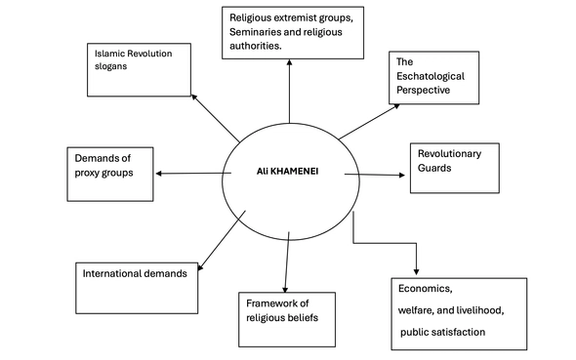
Islamic Revolution Slogans: The destruction and elimination of Israel are merely slogans and not the primary goal of the Islamic Republic. The existence of Israel serves to justify the Revolutionary Guards' extraterritorial operations. Enmity with Israel is necessary for the Islamic Republic to establish a sphere of influence in regional politics and gain credibility with the international community. However, this enmity is often used as a cliché and serves the propaganda of the system.
Unchanging religious beliefs: It is a collection of ingrained patterns in the mind of Ayatollah Khamenei that remain unchanged. Khamenei's interpretations of Quranic and religious matters are subjective and personal. For instance, he asserts that hijab is a religious obligation and unveiling is religiously prohibited, a stance that reflects solely his personal interpretation. In the context of the Israel issue, the "End-time view" serves as a smokescreen, hindering our ability to objectively understand the issues and equations from a rational and logical perspective.
The Eschatological Perspective: The narratives surrounding the end times, particularly concerning the appearance of the Twelfth Imam among Shiites, adopt a geostrategic approach, pinpointing the emergence in Syria and Lebanon. Traditionally, Shiites were expected to await the reappearance passively, but in the new Mahdism, it is argued that they should actively pave the way for the Imam's return. From an eschatological perspective, one of the actions required for the reappearance is the weakening of Israel and Zionist ideology. Equipping fighters against Israel is considered a religious and unequivocal duty for all Muslims worldwide.
Pressure from allied groups and internal systemic pressures are deemed influential factors in Khamenei's cognitive perception. In this regard, hardliners, pressure groups, seminaries, the Revolutionary Guards, and proxy groups all wield significant influence in shaping Khamenei's perception and decision-making process.
International imperatives should also be considered among the factors influencing Khamenei's cognitive perception. Currently, one of the reasons that have made revenge and emotional reactions costly and challenging for Khamenei is these international imperatives.
If we prioritize Khamenei's cognitive map, the people’s interests and the economic welfare of Iranians would be relegated to the bottom row. The interests of the people and public satisfaction exert the least influence on Khamenei's decisions.
All the factors mentioned form the foundation of Khamenei's cognitive perception. However, it's important to note that Khamenei's decisions may not always stem from rational and collective reasoning.
Therefore, despite the significance of international imperatives, the influence of hardliners and Islamic Revolutionary Guards commanders, and the demands of proxy groups for direct engagement with Israel, the system could potentially be led into a significant gamble.
Khamenei in a State of Absolute Inaction
It seems that Khamenei's pieces on the regional chessboard have entered a state of inaction. Under the influence of his supporters' demands, he made a strategic mistake by emphasizing revenge. Khamenei has accepted the risk of attack to leave a historical legacy and proudly show the supporters of the Islamic Republic that the sky of Israel was showered with missiles. Even if Israel does not suffer serious damage, they are proud to have been sincere in their promise to punish Israel.
Another question arises: Why did the Islamic Republic feel compelled to attack Israel?
Commander Salami, the head of the Islamic Revolutionary Guards, announced after the attack, "We have decided to create a new strategy, and that is from now on, if Israel attacks our interests and personalities anywhere, we will counterattack from the origin, the Islamic Republic of Iran".
Could the reason for this change in strategy be the reluctance of proxy groups during Israel’s attack on the purported Iranian consulate, as these groups had no interest in supporting or incurring costs for the Islamic Republic?






